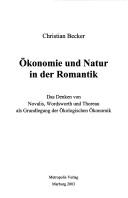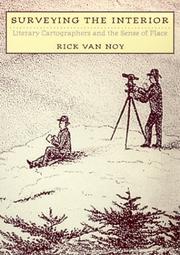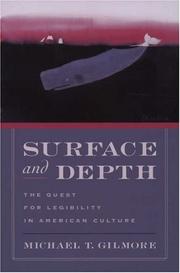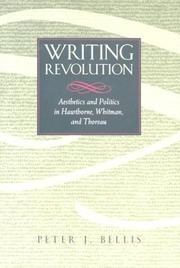| Listing 1 - 4 of 4 |
Sort by
|

ISBN: 389518439X 9783895184390 Year: 2003 Publisher: Marburg : Metropolis,
Abstract | Keywords | Export | Availability | Bookmark
 Loading...
Loading...Choose an application
- Reference Manager
- EndNote
- RefWorks (Direct export to RefWorks)
Environmental economics. --- Menschenbild. --- Naturverständnis. --- Romanticism. --- Umweltökonomie. --- Wirtschaftstheorie. --- Novalis, --- Novalis. --- Thoreau, Henry David, --- Thoreau, Henry David. --- Wordsworth, William, --- Criticism and interpretation.

ISBN: 0874175747 9780874175745 0874175488 9780874175486 0874175739 9780874175738 Year: 2003 Publisher: Reno Las Vegas University of Nevada Press
Abstract | Keywords | Export | Availability | Bookmark
 Loading...
Loading...Choose an application
- Reference Manager
- EndNote
- RefWorks (Direct export to RefWorks)
"From the very beginning, American literature was closely intertwined with surveying. In Surveying the Interior, Rick Van Noy explores the ways that four American literary cartographers - Henry David Thoreau, Clarence King, John Wesley Powell, and Wallace Stegner - concerned themselves with what it means to map or survey a place and what it means to write about it. In the process, he helps to define the ways by which space enters the human psyche as definable place, as well as the ways by which physical landscape is transmuted - through the vagaries of human perception, representative processes, and emotion - into a sense of place as an intimate, personal manifestation of both physical and existential realities."--Jacket.
Landscapes in literature. --- Wilderness areas in literature. --- Place (Philosophy) in literature. --- Surveying --- Environmental protection in literature. --- Cartography --- Nature in literature. --- American literature --- Landscape in literature --- Cities and towns --- City surveying --- Land surveying --- Engineering --- Geodesy --- Geomatics --- Cartography, Primitive --- Chartography --- Map-making --- Mapmaking --- Mapping (Cartography) --- Mathematical geography --- Map projection --- Maps --- Nature in poetry --- History. --- History and criticism. --- King, Clarence, --- Stegner, Wallace, --- Powell, John Wesley, --- Thoreau, Henry David, --- Thoreau, Henry David --- Thoreau, Henry D. --- Toro, Genri Devid, --- Thoreau, Henry, --- Toro, Henri Dejvid, --- Thorō, Enry Deēvint, --- So-lo, --- Toro, Henri Daṿid, --- Thoreau, David Henry, --- Sorō, Henrī Deividdo, --- טהארא, הענרי דייוויד --- טהארא, הענרי דײװיד --- תורו, הנרי דוד --- תורו, הנרי דוד, --- 梭罗, --- ソロー ヘンリー・デイヴィッド, --- Powell, Wes, --- Powell, J. W. --- Stegner, Wallace Earle, --- Todd, James, --- Knowledge --- Cartography. --- 19th century --- History and criticism --- Powell, John Wesley --- Stegner, Wallace Earle --- King, Clarence, 1842-1901 --- United States --- History --- Landscapes in literature --- Environmental protection in literature --- Place (Philosophy) in literature

ISBN: 0195157761 0199787786 0195313240 1280502770 9786610502776 160256941X 019803587X 0190289066 Year: 2003 Publisher: Oxford [etc.] Oxford University Press
Abstract | Keywords | Export | Availability | Bookmark
 Loading...
Loading...Choose an application
- Reference Manager
- EndNote
- RefWorks (Direct export to RefWorks)
The idea of a common American culture has been in retreat for a generation or more. Arguments emphasizing difference have discredited the grand synthetic studies that marginalized groups and perspectives at odds with the master narrative. Surface and Depth: The Quest for Legibility in American Culture is a fresh attempt to revitalize an interpretive overview. It seeks to recuperate a central tradition while simultaneously recognizing how much that tradition has occluded. The book focuses on the American zeal for knowing or making accessible. This compulsion has a long history stretching back to Puritan anti-monasticism; to the organization of the landscape into clearly delineated gridwork sections; and to the creation of a national government predicted on popular vigilance. It can be observed in the unmatched American receptivity to the motion pictures and to psychoanalysis: the first a technology of visual surfaces, the second a technique for plumbing interior depths. Popular literature, especially the Western and the detective story, has reinscribed the cult of legibility. Each genre features a plot that drives through impediments to transparent resolution. Elite literature has adopted a more contradictory stance. The landmarks of the American canon typically embark on journeys of discovery while simultaneously renouncing the possibility of full disclosure (as in Ahab's doomed pursuit of the "inscrutable" white whale). The notorious modernism of American literature, its precocious attraction to obscurity and multiple meaning, evolved as an effort to block the intrusions of a hegemonic cultural dynamic. The American passion for knowability has been prolific of casualties. Acts of making visible have always entailed the erasure and invisibility of racial minorities. American society has also routinely trespassed on customary areas of reserve. A nation intolerant of the hidden paradoxically pioneered the legal concept of privacy, but it did so in reaction to its o
Sociology of literature --- Fiction --- American literature --- American national characteristics in literature --- Amerikaans volkskarakter in de literatuur --- Caractéristiques nationales américaines dans la littérature --- National characteristics [American ] in literature --- Problèmes sociaux dans la littérature --- Social problems in literature --- Sociale problemen in de literatuur --- Volkskarakter [Amerikaans ] in de literatuur --- Wharton, Edith Newbold, 1862-1937. Summer --- American fiction --- American prose literature --- Literature and society --- National characteristics, American, in literature. --- Social problems in literature. --- History and criticism. --- United States --- Civilization. --- In literature. --- National characteristics, American, in literature --- History and criticism --- In literature --- Civilization --- Melville, Herman --- Thoreau, Henry David --- Hawthorne, Nathaniel --- Fitzgerald, Francis Scott --- Poe, Edgar Allan --- Criticism and interpretation --- Fern, Fanny --- Cooper, James Fenimore

ISBN: 0820323926 9780820323923 9786612552892 0820327204 1282552899 0820334618 9780820327204 9781282552890 6612552891 Year: 2003 Publisher: Athens London University of Georgia Press
Abstract | Keywords | Export | Availability | Bookmark
 Loading...
Loading...Choose an application
- Reference Manager
- EndNote
- RefWorks (Direct export to RefWorks)
Aesthetics, American --- American literature --- Politics and literature --- Revolutionary literature, American --- American revolutionary literature --- American aesthetics --- History and criticism --- History --- Hawthorne, Nathaniel, --- Thoreau, Henry David, --- Whitman, Walt, --- Thoreau, Henry D. --- Toro, Genri Devid, --- Thoreau, Henry, --- Toro, Henri Dejvid, --- Thorō, Enry Deēvint, --- So-lo, --- Toro, Henri Daṿid, --- Thoreau, David Henry, --- Sorō, Henrī Deividdo, --- טהארא, הענרי דייוויד --- טהארא, הענרי דײװיד --- תורו, הנרי דוד --- תורו, הנרי דוד, --- 梭罗, --- ソロー ヘンリー・デイヴィッド, --- Gotorn, Nataniėlʹ, --- Hotorn, Natanijel, --- Huo-sang, --- Huo-sang, Na-sa-ni-erh, --- Hothorna, Netheniyala, --- Готорн, Натаниэль, --- האטארן, נאטאניעל, --- Huosang, --- Huosang, Nasa'nier, --- Nasa'nier Huosang, --- 霍桑, --- 霍桑, 纳撒尼尔, --- 纳撒尼尔 霍桑, --- Aesthetics. --- Political and social views. --- Whitman, Walt --- Thoreau, Henry David --- 19th century --- United States --- Hawthorne, Nathaniel --- Political and social views --- Revolutionary literature [American ] --- Aesthetics --- Aesthetics [American ] --- Hās̲ūran, Nātānīl, --- Hās̲ūrn, Nātānīl, --- هاثورن، ناتانيل --- Ouïtman, Ouōlt, --- Uitman, Uolʹt, --- Uitmen, Uot, --- Uitmen, Uolt, --- Viṭman̲, Vālṭ, --- Vālṭ Viṭman̲, --- Witʻŭmŏn, --- Ṿiṭman, Ṿolṭ, --- Vālṭviṭman̲, --- Waltvitmen, --- Whitman, Walter, --- Huiteman, --- Veeitman, --- Уитмен, Уолт, --- ויטמן, וולט, --- װיטמאן, װאלט, --- ويتمن، والت، --- Vitmen, Volt, --- Uitman, Uollt, --- Huiteman, Huate, --- 華特·惠特曼, --- Gotorn, Nataniėlʹ --- Hotorn, Natanijel --- Huo-sang --- Huo-sang, Na-sa-ni-erh --- Hothorna, Netheniyala --- Готорн, Натаниэль --- Huosang --- Huosang, Nasa'nier --- Nasa'nier Huosang --- Hās̲ūran, Nātānīl --- Hās̲ūrn, Nātānīl --- Aesthetics, American. --- History and criticism.
| Listing 1 - 4 of 4 |
Sort by
|

 Search
Search Feedback
Feedback About UniCat
About UniCat  Help
Help News
News